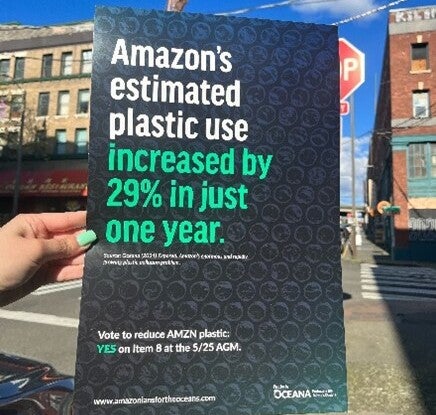
Almost 50% of e-commerce giant Amazon’s shareholders have voted in favour of a resolution that would require the company to reveal its plastic packaging footprint.
In a ballot held during Amazon’s Annual Meeting on 25 May, the proposal won the support of 48% of the retailer’s shareholders.

Discover B2B Marketing That Performs
Combine business intelligence and editorial excellence to reach engaged professionals across 36 leading media platforms.
The resolution was presented by Conrad MacKerron, senior vice-president of non-profit organisation As You Sow.
It asks Amazon to report its plastic packaging footprint and implement plans to reduce its use of plastic packaging.
Despite failing to clear investors’ approval, the resolution secured 181,296,823 votes, which was more than any other resolution considered at the meeting.
Ahead of the meeting, non-profit ocean conservation organisation Oceana urged Amazon shareholders to vote ‘Yes’ on Item Eight during the vote.

US Tariffs are shifting - will you react or anticipate?
Don’t let policy changes catch you off guard. Stay proactive with real-time data and expert analysis.
By GlobalDataThe organisation sent a letter to shareholders providing five reasons why they should support the resolution earlier this year.
It also encouraged signatories to the UN Principles for Responsible Investment (PRI), many of whom are Amazon shareholders, to support the resolution.
Oceana senior vice-president Matt Littlejohn said: “Nearly half of Amazon shareholders have spoken up for the oceans, sending a clear message that it’s time for the company to address its contribution to the plastic pollution problem.
“Amazon’s plastic packaging – as Oceana’s most recent report indicated – grew by nearly 29% in just one year.
“Sea turtles and other ocean animals often mistake plastic for food, which can ultimately prove fatal.
“Amazon is a data-driven company and has indicated to Oceana that it already measures its plastic use.
“It’s time for the company to be transparent about its plastic packaging and commit to quantifiable and time-bound company-wide goals to reduce it.”
In December last year, data from Oceana showed that plastic pollution caused by Amazon’s deliveries increased by 29% over the course of a year.





